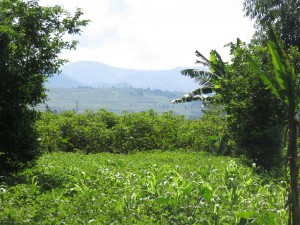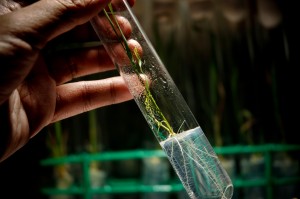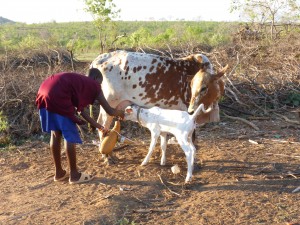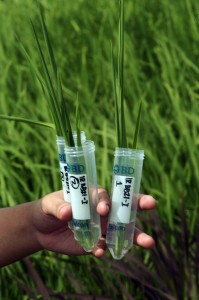Socio-Economic Intensification
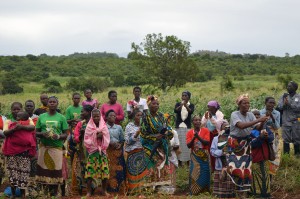
Farmers at an AGRA-supported demonstration plot, Mozambique. Credit, Agriculture for Impact
Socio-economic Intensification involves a greater intensity, variety and range of involvement of farmers in social and economic processes and institutions on the farm, in the community and across regions and nations. Adoption of new practices and technologies by farmers will only happen and persist if an appropriate enabling environment is supported that favours not only agricultural intensification but also its sustainability.
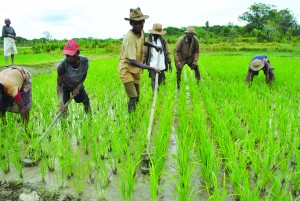
Farmers demonstrate new techniques learned from a farmer field school. Credit, USAID.
African smallholders require equitable access to input and output markets and help with joining remunerative value chains. Without secure rights to land they will not invest in improvements to their farms. Farmer associations, including cooperatives, outgrower and contract farmer groups, are essential if smallholders are to exert their bargaining power. Increasing productivity on current land will also require significant investments in agricultural research and extension, in the road infrastructure that links farmers to markets and in the development of better rural services, including access to education and health care.
Socio-economic Intensification is one of the 3 pillars of Sustainable Intensification, alongside Ecological Intensification and Genetic Intensification. Socio-Economic Intensification involves supportive enabling environments, and building the social and human capital of smallholder farmers. A supportive enabling environment combines macro-economic policies that favour markets and trade, the provision of inputs, related physical infrastructure (such as roads and irrigation) and social infrastructure (such as education and research),[1] together with institutions.[2] Methods in Ecological and Genetic Intensification can help farmers to produce more with less, but an enabling environment is required to allow innovation for Sustainable Intensification to be adopted.[3]
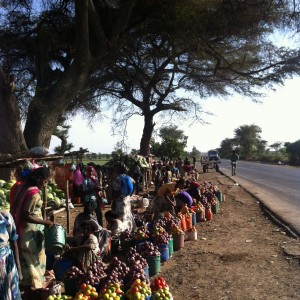
Road side market selling fresh fruit and vegetables, Oromia, Ethiopia. Credit, Agriculture for Impact
Well-functioning markets facilitate trade and enable the distribution and allocation of resources in a society. They are vital for agricultural development and poverty reduction and are the basis of rapidly developing agribusiness value chains that provide opportunities for smallholder farmers. Insurance, a tool to manage price and production risk, can encourage farmers to adopt production systems that are potentially more resilient, productive and more profitable, but involve greater financial risk. Agricultural finance is the provision of services that are dedicated to supporting both on- and off-farm agricultural related activities, but it must become accessible and affordable to smallholders.
Social capital is the value that can be created through social networking and trust within and between people and organisations, an important element for creating sustainable livelihoods and economic development.[4] In fact, social capital may be the most important resource available to poor communities burdened with low incomes, poor education and few assets.[5] Cooperatives, value chains and institutions create the infrastructure for relationships to be developed, forming the basis for building social capital and contributing to socio-economic intensification through peer to peer learning[6],[7],[8] and better access to flows of products, knowledge and information.
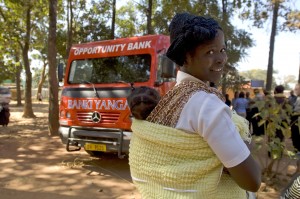
Mobile banking vehicle providing access to finance for rural people in Malawi. Credit, Gates Foundation.
Human capital or capacities, such as education and health, can raise productivity and increase livelihoods and food security when leveraged or increased.[9] It plays a critical role in economic growth and development because human beings occupy the centre of production, distribution and consumption. Agricultural education and training, extension and research are all key in building the capacity of farmers, but only if they are responsive to farmers’ needs and the realities they face. Agricultural education and training can strengthen capabilities and positively impact productivity since educated farmers better enabled to adopt and apply new technologies.[10] The role of extension services is invaluable in teaching farmers how to improve their productivity and to engage in participatory research, a collaborative process oriented towards social transformation.[11]
Click on a Category to Learn More












